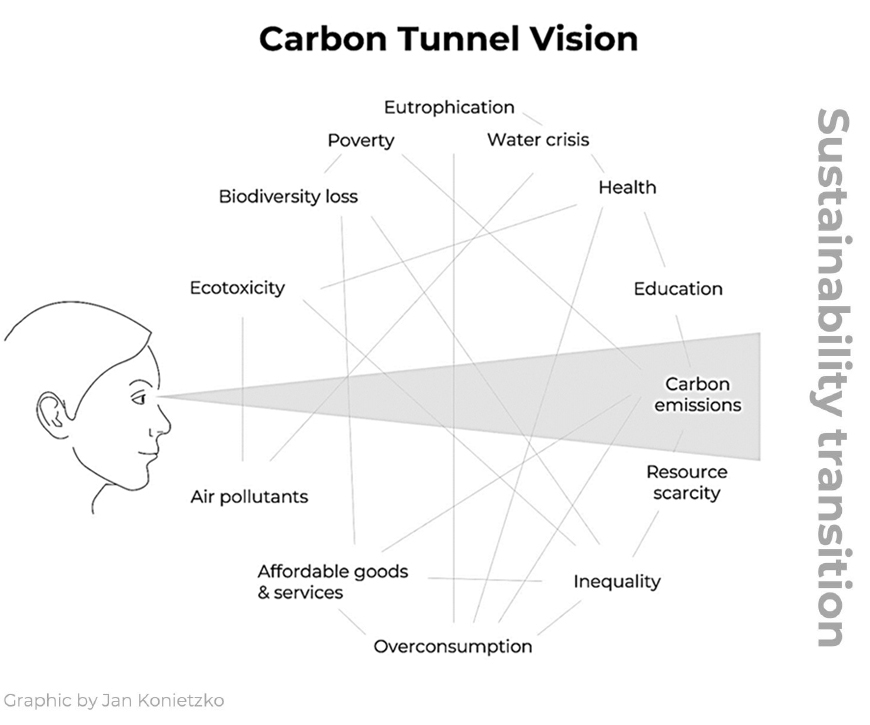Get the right experience for you. Please select your location and investor type.
IMPORTANT NEWS: Transition of investment management responsibilities
First Sentier Group, the global asset management organisation, has announced a strategic transition of Stewart Investors' investment management responsibilities to its affiliate investment team, FSSA Investment Managers, effective Friday, 14 November close of business EST.

Sustainable Investing: Don’t forget the humans
Climate change is one of our greatest threats. At Stewart Investors we consider it a key investment risk, and an investment opportunity.
Sustainable investment is increasingly focused on climate change and the transition to a low carbon economy.
Morningstar identified 860 funds with a climate-related mandate in 2021 and estimates this number increased by more than a third in 20221. Financial regulators are calling for investors to increase their climate-risk disclosure and there is an increasing number of industry collaborations such as the Glasgow Financial Alliance for Net Zero. This increased attention to climate change by the financial community is both welcome, and understandable, given the frequency of record-breaking weather events and concerning levels of pollution and biodiversity loss we face.

Climate change is one of our greatest threats. At Stewart Investors we consider it a key investment risk, and an investment opportunity. However our definition of sustainability is broader than just climate change, and encompasses a wide range of environmental and human development considerations. Instead of viewing sustainability issues in isolation, we think of them as part of an interconnected and interdependent web of challenges.
Take income inequality as an example. It is usually linked to access to education, which is often linked to poverty, which can be linked to food insecurity, which is increasingly linked to climate change and biodiversity loss, which can link back to poverty and inequality, and so on. Efforts to improve human development will be limited if we don’t address climate change, and efforts to address climate change will be undermined, if we don’t improve human development.
Why? Let’s consider demographic change. In 2022, the eight billionth person was born2. The world’s population grew by one billion people over the last 12 years3, mostly in Asia. It is currently growing by more than 200,000 people each day4. As things stand, 70% of the world’s population live in countries running an ecological deficit while generating a below-world-average income5. If everyone is to live like the average Brit or American, we will need at least 3-5 planets worth of resources to sustain ourselves.6
The Global Footprint Network illustrates this point well, and maps countries according to their human development and ecological footprint.
The Human Development Index (horizontal axis) measures a country’s life expectancy, education and income. The ecological footprint (vertical axis) measures the stock of natural resources it takes to sustain a country’s economy and population.
As countries improve their human development, they also tend to increase their ecological footprint. Wealthy people and countries have a disproportionately large ecological footprint and some studies suggest they are responsible for a growing proportion of total global emissions.7
So it is clear we need to change, and find ways to improve living standards while staying within environmental limits. This requires governmental action and broad societal change, but the private sector has a crucial role to play too. This is our investment hunting ground, where we search for publicly-listed companies that are helping societies move to the bottom right-hand section of the chart above.
How do we invest?
Our investment philosophy is to only invest in high-quality companies that we believe are contributing to a more sustainable future. We look for companies that are helping to reduce our ecological footprint, or advance human development, or ideally both. Some companies are reducing healthcare costs, or providing financial services to lower income communities in emerging markets. Others are providing technologies for electrification, waste reduction and industrial process efficiencies.
Many companies are doing wonderful things for society or the environment, but we only invest in those that meet our high quality criteria. Equally, there are many high-quality companies in our investable universe that we avoid because they are not contributing to a more sustainable future.
When we refer to quality, we don’t simply focus on high margins, profit growth and returns. We take a more nuanced and qualitative approach, and assess the quality of the people running the businesses, the quality of the franchises and the financials. Among other things, we look for companies led by outstanding, long-term focused stewards, who look after all their stakeholders. We look for franchises that are resilient, competitive and have pricing power. And we look for companies with simple and conservative financials, with strong balance sheets, that avoid financial shenanigans.
Similarly, for sustainability, we don’t rely on simple Environmental, Social and Governance (ESG) scores, or carbon footprints. We focus on the societal impact of the products and services being sold; on how company leaders behave; on the operational impacts of the company, and on how well placed a company is to benefit from sustainability tailwinds. We pay just as much attention to human development as we do to environmental issues, because both are equally important for a more sustainable future.
We believe this rounded approach to sustainable investment helps us avoid and mitigate risks, identify opportunities that are different from our peers, and above all, deliver strong returns.
Company Case Study 1 – Leading provider of housing finance in India.
The company is the leading provider of housing loans in India and one of the most recognised and trusted brands in the country8. Around half of their loans are to new home owners and around a third to lower-income households. It is benefiting from structural tailwinds as mortgage penetration in India is still only 11% of GDP, compared with 52% in the USA9; two-thirds of India’s population is under the age of 3510; and the average age of a first-time home buyer is 3811. Mortgage demand is increasing as people migrate from rural areas to cities and as the nuclear family model becomes more commonplace. Since its founding in 1978, the company has financed over nine million housing units and the mortgage market is expected to more than double in the next five years12.
Company Case Study 2 – Equipment for diagnosing infectious diseases and screening for cancer.
The company is family-owned providing instruments and consumables for diagnosing infectious diseases and detecting bacteria in food, pharmaceutical and cosmetic products. It is also the world leader in researching and providing solutions for antimicrobial resistance13, which kills 700,000 people each year. The business model is resilient, with 90% of revenues coming from the recurring sale of reagents and services, and the balance sheet is net cash14. The company is benefiting from the move towards personalised medicine, while combatting the increasing number of infectious diseases we face.
For more information about each company we invest in, and a summary of how each improves human development and reduces our ecological footprint, please visit our interactive portfolio explorer tool here.
Want to know more?
Important Information
This material is a financial promotion / marketing communication but is for general information purposes only. It does not constitute investment or financial advice and does not take into account any specific investment objectives, financial situation or needs. This is not an offer to provide asset management services, is not a recommendation or an offer or solicitation to buy, hold or sell any security or to execute any agreement for portfolio management or investment advisory services and this material has not been prepared in connection with any such offer. Before making any investment decision you should conduct your own due diligence and consider your individual investment needs, objectives and financial situation and read the relevant offering documents for details including the risk factors disclosure.
Any person who acts upon, or changes their investment position in reliance on, the information contained in these materials does so entirely at their own risk.
We have taken reasonable care to ensure that this material is accurate, current, and complete and fit for its intended purpose and audience as at the date of publication. No assurance is given or liability accepted regarding the accuracy, validity or completeness of this material.
To the extent this material contains any expression of opinion or forward-looking statements, such opinions and statements are based on assumptions, matters and sources believed to be true and reliable at the time of publication only. This material reflects the views of the individual writers only. Those views may change, may not prove to be valid and may not reflect the views of everyone at First Sentier Group.
Past performance is not indicative of future performance. All investment involves risks and the value of investments and the income from them may go down as well as up and you may not get back your original investment. Actual outcomes or results may differ materially from those discussed. Readers must not place undue reliance on forward-looking statements as there is no certainty that conditions current at the time of publication will continue.
References to specific securities (if any) are included for the purpose of illustration only and should not be construed as a recommendation to buy or sell the same. Any securities referenced may or may not form part of the holdings of First Sentier Group portfolios at a certain point in time, and the holdings may change over time.
References to comparative benchmarks or indices (if any) are for illustrative and comparison purposes only, may not be available for direct investment, are unmanaged, assume reinvestment of income, and have limitations when used for comparison or other purposes because they may have volatility, credit, or other material characteristics (such as number and types of securities) that are different from the funds managed by First Sentier Group.
Selling restrictions
Not all First Sentier Group products are available in all jurisdictions.
This material is neither directed at nor intended to be accessed by persons resident in, or citizens of any country, or types or categories of individual where to allow such access would be unlawful or where it would require any registration, filing, application for any licence or approval or other steps to be taken by First Sentier Group in order to comply with local laws or regulatory requirements in such country.
About First Sentier Group
References to ‘we’, ‘us’ or ‘our’ are references to First Sentier Group, a global asset management business which is ultimately owned by Mitsubishi UFJ Financial Group (MUFG). Certain of our investment teams operate under the trading names AlbaCore Capital Group, First Sentier Investors, FSSA Investment Managers, Stewart Investors and RQI Investors all of which are part of the First Sentier Group. RQI branded strategies, investment products and services are not available in Germany.
This material may not be copied or reproduced in whole or in part, and in any form or by any means circulated without the prior written consent of First Sentier Group.
We communicate and conduct business through different legal entities in different locations. This material is communicated in:
- Australia and New Zealand by First Sentier Investors (Australia) IM Ltd, authorised and regulated in Australia by the Australian Securities and Investments Commission (AFSL 289017; ABN 89 114 194311)
- European Economic Area by First Sentier Investors (Ireland) Limited, authorised and regulated in
- Ireland by the Central Bank of Ireland (CBI reg no. C182306; reg office 70 Sir John Rogerson’s Quay, Dublin 2, Ireland; reg company no. 629188)
- Hong Kong by First Sentier Investors (Hong Kong) Limited and has not been reviewed by the Securities & Futures Commission in Hong Kong. First Sentier Group, First Sentier Investors, FSSA Investment Managers, Stewart Investors, RQI Investors and Igneo Infrastructure Partners are the business names of First Sentier Investors (Hong Kong) Limited.
- Singapore by First Sentier Investors (Singapore) (reg company no. 196900420D) and this advertisement or material has not been reviewed by the Monetary Authority of Singapore. First Sentier Group (registration number 53507290B), First Sentier Investors (registration number 53236800B), FSSA Investment Managers (registration number 53314080C), Stewart Investors (registration number 53310114W), RQI Investors (registration number 53472532E) and Igneo Infrastructure Partners (registration number 53447928J) are the business names of First Sentier Investors (Singapore).
- United Kingdom by First Sentier Investors (UK) Funds Limited, authorised and regulated by the Financial Conduct Authority (reg. no. 2294743; reg office Finsbury Circus House, 15 Finsbury Circus, London EC2M 7EB)
- United States by First Sentier Investors (US) LLC, registered with the Securities Exchange Commission (SEC# 801-93167).
- other jurisdictions, where this document may lawfully be issued, by First Sentier Investors International IM Limited, authorised and regulated in the UK by the Financial Conduct Authority (FCA ref no. 122512; Registered office: 23 St. Andrew Square, Edinburgh, EH2 1BB; Company no. SC079063).
To the extent permitted by law, MUFG and its subsidiaries are not liable for any loss or damage as a result of reliance on any statement or information contained in this document. Neither MUFG nor any of its subsidiaries guarantee the performance of any investment products referred to in this document or the repayment of capital. Any investments referred to are not deposits or other liabilities of MUFG or its subsidiaries, and are subject to investment risk, including loss of income and capital invested.
© First Sentier Group


